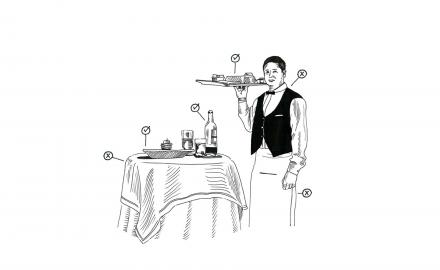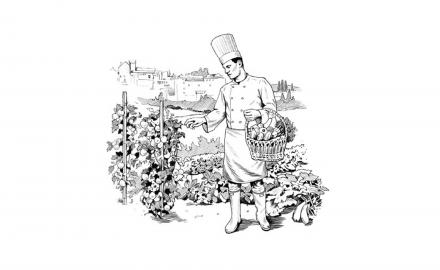N°4 INNOVATION AT THE HEART OF TOMORROW’S CULINARY MANAGEMENT
HOW WOULD YOU DEFINE INNOVATION?
Innovation means the end-to-end rollout of a process from the birth of an idea through to its full and tangible implementation. Innovation strives to improve what already exists and applies to products, processes, services, and so on… The concept of innovation therefore automatically conveys the notion of positive change.
HOW DO YOU DIFFERENTIATE BETWEEN CREATIVITY AND INNOVATION?
While these two terms have become completely interchangeable in general everyday speech, they do not actually mean the same thing at all! Creativity refers to a new idea born out of dreams or imagination. Innovation is the process by which both this new idea is brought to life and significant changes are made to a system that had been considered relatively stable. Creativity is just one stage in the overall process of innovation. Unlike innovation,
COULD YOU GIVE US A FEW EXAMPLES OF RECENT INNOVATIONS IN THE HOTEL AND CATERING SECTOR?
The Grand Prix Sirha Innovation 2013 honoured Rougié® for its frozen, shelled Blue Lobster. Their use of a revolutionary new quick freeze technique makes it possible to preserve all the taste and texture of a lobster... It also ensures the shellfish a stress-free death: lobsters are plunged into a waterfilled tank and subjected to pressure variations that make them lose consciousness. They are then shelled manually and their meat cryogenically frozen before being vacuum packed. Another example that comes to mind is Palcohol, which is scheduled for launch in the United States next autumn. This powdered alcohol, which can be mixed with water, or with other liquids or foods, will help to optimise transport logistics for liquid products. Food pairing, which provides chefs with a formidable platform for their creativity, is another superb innovation: partnering computer processing technology with analyses of product-specific organoleptic properties allows chefs to discover a host of unique and unexpected flavours (strawberryparmesan, oyster-passion fruit, cucumber-dried fig, and many others )... along with an infinite number of culinary opportunities!
IN WHAT WAY DOES THE BUSINESS INCUBATOR SET UP AT THE INSTITUT PAUL BOCUSE GENUINELY DRIVE INNOVATION?
In 2011, the School set up the first business incubator for the hotel and catering sector, dedicated to driving forward innovative projects. The IPB also lent the incubator € 1,000 to finance initial administrative costs. There is a real dynamic that develops between current and former incubated chefs, who benefit from a remarkable network.
BY DEVELOPING NOVEL CONCEPTS, THE IPB ACTS AS AN OUTSTANDING CULINARY “THINK-TANK”…
Creativity is the heart of our business. As part of SIRHA 2013, a group of 3rd year Bachelors in International Hotel and Catering Management created five concepts for pop-up restaurants and bars. This project, baptised Sixième Sens, mobilised the whole “Design Thinking Department”. We set up a week-long “Concept Creation & Design Seminar” designed to boost student creativity and discussion. It took the students six weeks to prepare the Sixième Sens-Collections Scènes de Table, putting the concepts into practice and bringing them to life in the kitchen and dining room. In all, the students welcomed over 800 customers over the five days of the show—a resounding success story.
THE DESIGN THINKING DEPARTMENT Management, marketing, engineering, psychology, architecture and ethnography are at the heart of the Design Thinking Department, which is articulated around a combination of three core components: the understanding of a context, the proposal of creative ideas and solutions
ZOOM ON... CULINARY INNOVATION and the rational analysis of these solutions. Thinking is mainly focused on user experience and co-creativity, thus encouraging a global approach to projects. The design thinking department uses a wide range of tools including customer journey mapping, story-boards, development of prototypes, and so on.
Realize with Institut Paul Bocuse



